Kamis, 26 September 2019
'We will respect the law and we will come out on October 31' Boris Johnson tells ITV - Guardian News
https://www.youtube.com/watch?v=K6uMBcOkwYU
2019-09-26 03:29:51Z
52780390506010
Khashoggi murder 'happened under my watch,' Saudi crown prince tells PBS - Reuters
RIYADH (Reuters) - Saudi Arabia’s crown prince said he bears responsibility for the killing of journalist Jamal Khashoggi last year by Saudi operatives “because it happened under my watch,” according to a PBS documentary to be broadcast next week.
Saudi Arabia's Crown Prince Mohammed bin Salman attends a meeting with U.S. Secretary of State Mike Pompeo in Jeddah, Saudi Arabia, September 18, 2019. Mandel Ngan/Pool via REUTERS
Mohammed bin Salman, the kingdom’s de facto ruler, has not spoken publicly about the killing inside the Saudi consulate in Istanbul. The CIA and some Western governments have said he ordered it, but Saudi officials say he had no role.
The death sparked a global uproar, tarnishing the crown prince’s image and imperiling ambitious plans to diversify the economy of the world’s top oil exporter and open up cloistered Saudi society. He has not since visited the United States or Europe.
“It happened under my watch. I get all the responsibility, because it happened under my watch,” he told PBS’ Martin Smith, according to a preview of a documentary, “The Crown Prince of Saudi Arabia,” set to air on Oct. 1, ahead of the one-year anniversary of Khashoggi’s death.
After initial denials, the official Saudi narrative blamed the murder on rogue operatives. The public prosecutor said the then-deputy intelligence chief ordered the repatriation of Khashoggi, a royal insider who became an outspoken critic, but the lead negotiator ordered him killed after discussions for his return failed.
Saud al-Qahtani, a former top royal adviser whom Reuters reported gave orders over Skype to the killers, briefed the hit team on Khashoggi’s activities before the operation, the prosecutor said.
Asked how the killing could happen without him knowing about it, Smith quotes Prince Mohammed as saying: “We have 20 million people. We have 3 million government employees.”
Smith asked whether the killers could have taken private government jets, to which the crown prince responded: “I have officials, ministers to follow things, and they’re responsible. They have the authority to do that.” Smith describes the December exchange, which apparently took place off camera, in the preview of the documentary.
A senior U.S. administration official told Reuters in June the Trump administration was pressing Riyadh for “tangible progress” toward holding to account those behind the killing ahead.
Eleven Saudi suspects have been put on trial in secretive proceedings but only a few hearings have been held. A U.N. report has called for Prince Mohammed and other senior Saudi officials to be investigated.
Khashoggi, a Washington Post columnist, was last seen at the Saudi consulate in Istanbul on Oct. 2, where he was to receive papers ahead of his wedding. His body was reportedly dismembered and removed from the building, and his remains have not been found.
Reporting by Stephen Kalin; Editing by Gerry Doyle
https://www.reuters.com/article/us-saudi-khashoggi/khashoggi-murder-happened-under-my-watch-saudi-crown-prince-tells-pbs-idUSKBN1WB0HV
2019-09-26 05:40:00Z
CBMihgFodHRwczovL3d3dy5yZXV0ZXJzLmNvbS9hcnRpY2xlL3VzLXNhdWRpLWtoYXNob2dnaS9raGFzaG9nZ2ktbXVyZGVyLWhhcHBlbmVkLXVuZGVyLW15LXdhdGNoLXNhdWRpLWNyb3duLXByaW5jZS10ZWxscy1wYnMtaWRVU0tCTjFXQjBIVtIBNGh0dHBzOi8vbW9iaWxlLnJldXRlcnMuY29tL2FydGljbGUvYW1wL2lkVVNLQk4xV0IwSFY
Rabu, 25 September 2019
Trump Ukraine transcript: Read the full, unredacted transcript of the president's call with Ukraine president released by the White House today – live updates - CBS News
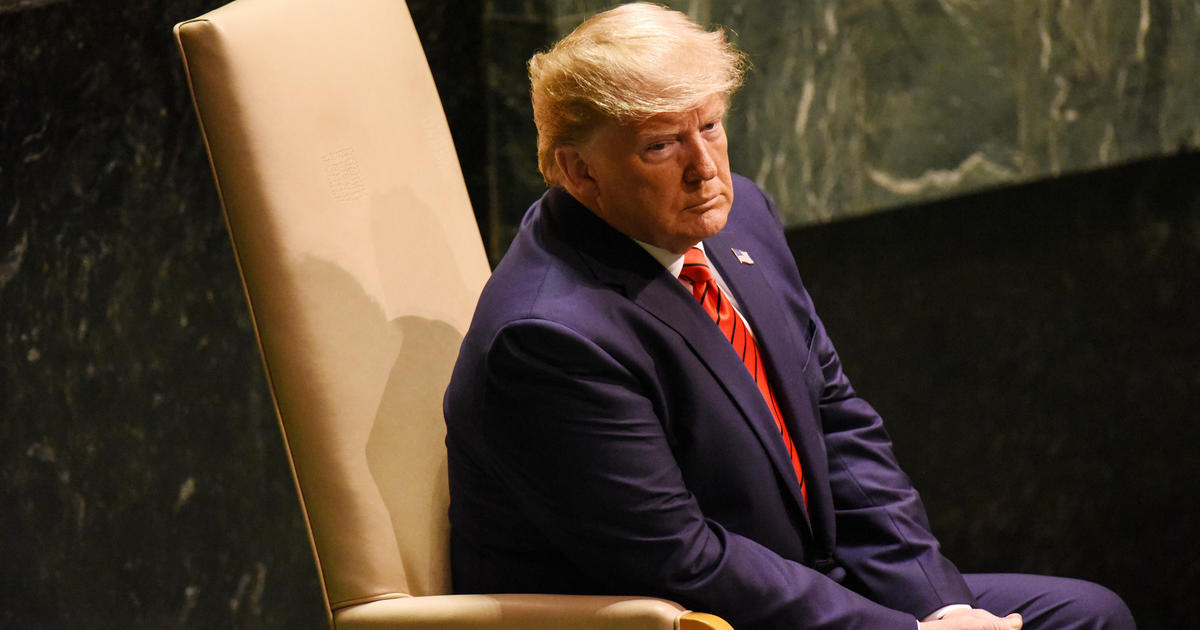
The Trump administration has released the much-anticipated transcript of President Trump's phone call with Ukraine President Volodymyr Zelensky, after Mr. Trump authorized publishing the transcript. A memo summarizing the call shows that the president urged Zelensky to probe Joe Biden and his son, Hunter Biden, who sat on the board of a Ukrainian natural gas company.
The transcript released by the Justice Department is not, according to the administration, a verbatim transcript. The text, according to the document released by the administration, is the record of the notes and recollections of the officers and National Security Council policy staff "assigned to listen and memorialize the conversation in written form."
According to the document, the president said on the call that he would like to find out what happened with "this whole situation with Ukraine" and he said his personal lawyer, Rudy Giuliani would be traveling to Ukraine. Zelensky said he would meet with Giuliani when he visited.
Trending News
Zelensky pledged that his new prosecutor would look into the case, and he asked for additional information.
Mr. Trump told Zelensky in the July 25 call that he would have Giuliani give him a call, and also have Attorney General William Barr call to get "to the bottom of it."
"I will have Mr. Giuliani give you a call and I am also going to have Attorney General Barr call and we will get to the bottom of it. I'm sure you will figure it out," Mr. Trump said.
Mr. Trump asked Zelensky to "do us a favor" and "find out what happened with this whole situation with Ukraine" with regards to Crowdstrike, a cybersecurity company which helped investigate Russian interference in the 2016 election.
Mr. Trump also asked Zelensky about the Bidens. The president has claimed without offering evidence that Biden, as vice president, had worked to remove a Ukrainian prosecutor specifically because he was investigating a company where Hunter Biden sat on the board of directors. That prosecutor was seen by the U.S. and by many European allies as corrupt.
"There's a lot of talk about Biden's son, that Biden stopped the prosecution, and a lot of people want to find out about that so whatever you can do with the Attorney General would be great. Biden went around bragging that he stopped the prosecution so if you can look into it ... It sounds horrible to me," Mr. Trump told Zelensky, in reference to Joe Biden.
At the United Nations, Wednesday, Mr. Trump remarked, "I will say that we do a lot for Ukraine. We spend a lot of effort and a lot of time." Until earlier this month, Mr. Trump had temporarily frozen $391 million in aid to Ukraine. Ultimately, the White House released the funds to Ukraine in September, after withholding the aid for about two months.
The full transcript released by the White House is below:
Mr. Trump, under pressure to release the transcript, had already confirmed he had discussed Biden with Zelensky and confirmed he slow-walked aid to Ukraine, although he claimed the two acts were unrelated. That call and a whistleblower complaint involving Mr. Trump have pushed growing numbers of Democrats to call for impeachment proceedings, which are now formally beginning, House Speaker Nancy Pelosi announced Wednesday afternoon.
Responding to the release of the transcript, Mr. Trump told reporters Wednesday that he was subject to "the single greatest witch hunt in American history, probably in history." Mr. Trump said "there was no pressure whatsoever" put on Zelensky, adding that "it turned out to be a nothing call" He slammed "fake news" and "corrupt reporting" about the phone call.
In a statement, Justice Department spokesperson Kerri Kupec said that the Justice Department had determined that "there was no campaign finance violation and that no further action was warranted."
"In August, the Department of Justice was referred a matter relating to a letter the director national intelligence had received from the inspector general for the intelligence community regarding a purported whistleblower complaint. The inspector general's letter cited a conversation between the president and Ukrainian President Zelensky as a potential violation of federal campaign finance law, while acknowledging that neither the inspector general nor the complainant had firsthand knowledge of the conversation," Kupec said.
"Relying on established procedures set forth in the justice manual, the department's criminal division reviewed the official record of the call and determined based on the facts and applicable law that there was no campaign finance violence and that no further action was warranted. All relevant components of the department agreed with this legal conclusion, and the department has concluded this matter," Kupec concluded.
In another statement, Kupec said that Barr had not spoken with Mr. Trump about Ukraine investigating Biden, and that the president had not asked Barr to contact Ukraine or Giuliani.
The Justice Department's Office of Legal Counsel (OLC) determined that the complaint needed to have a "connection with the operation of any U.S. Government intelligence activity, and the alleged misconduct does not involve any member of the intelligence community" in order to qualify as an "urgent concern." The OLC found that since the president is not a member of the intelligence community and that the activity in question did not pertain to any ongoing intelligence matters, that the complaint did not meet the standard of an "urgent concern."
Mr. Trump said Tuesday the transcript would reveal it was a "very friendly and totally appropriate call."
"No pressure and, unlike Joe Biden and his son, NO quid pro quo! This is nothing more than a continuation of the Greatest and most Destructive Witch Hunt of all time!" the president tweeted Tuesday afternoon. He suggested the next day that Democrats should apologize after seeing what was said on the call.
"They should, a perfect call - got them by surprise!" he tweeted Wednesday before its release.
Mr. Trump had previously said he hoped the public would see the transcript, but he feared the precedent it might set for other world leaders who want to keep their conversations with him private.
Biden, who called for the release of the transcript, insisted Tuesday Mr. Trump should be impeached if he continues to stonewall Congress.
"If the president doesn't comply with such a request from the Congress, he continues to obstruct Congress and flout the law, Donald Trump will leave Congress in my view no choice but to initiate impeachment," Biden said in a brief statement Tuesday afternoon. "That would be a tragedy but a tragedy of his own making."
But Democrats still aren't satisfied. That phone call is just one part of a whistleblower complaint Democrats want to see. House Intelligence Committee Chairman Adam Schiff tweeted Tuesday that the whistleblower wants to testify before his committee.
https://www.cbsnews.com/news/trump-ukraine-unredacted-call-transcript-read-ukraine-president-released-by-white-house-today-2019-09-25-live-updates/
2019-09-25 14:58:00Z
CAIiENCX_A8ewb4idHTkcTQcbycqGQgEKhAIACoHCAowyNj6CjDyiPICMKb_xAU
Trump Ukraine transcript: Read the full, unredacted transcript of the president's call with Ukraine president released by the White House today – live updates - CBS News
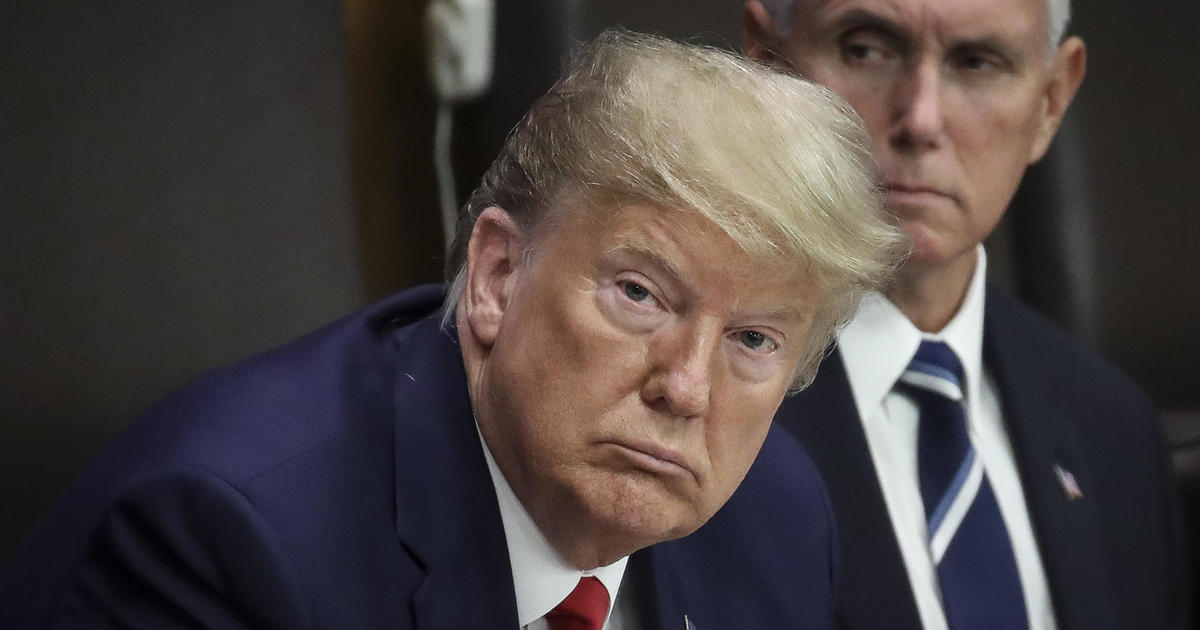
President Trump, while at the United Nations General Assembly (UNGA) Tuesday, announced in a pair of tweets that he's authorizing the release of the full transcript of his July call with Ukrainian President Volodymyr Zelensky. The transcript will be released to the public Wednesday.
"I am currently at the United Nations representing our Country, but have authorized the release tomorrow of the complete, fully declassified and unredacted transcript of my phone conversation with President Zelensky of Ukraine," he tweeted.
....You will see it was a very friendly and totally appropriate call. No pressure and, unlike Joe Biden and his son, NO quid pro quo! This is nothing more than a continuation of the Greatest and most Destructive Witch Hunt of all time!
— Donald J. Trump (@realDonaldTrump) September 24, 2019
"You will see it was a very friendly and totally appropriate call. No pressure and, unlike Joe Biden and his son, NO quid pro quo! This is nothing more than a continuation of the Greatest and most Destructive Witch Hunt of all time!"
Trending News
Speaking to reporters on the sidelines of the UNGA on Monday, the president had said he hoped reporters would see the transcript of the call, but later admitted he didn't necessarily want to release the transcript.
"I may do it because it was a very innocent call on both his part and mine," he said Monday of releasing the transcript of the call with Zelensky.
There have been growing calls for transparency over the president's call, which is the subject of a whistleblower complaint filed by someone in the intelligence community. The intelligence community's inspector general (ICIG) found that the complaint was both credible and of "urgent concern." The ICIG was supposed to turn the complaint over to the House Intelligence Committee, but the acting director of national intelligence, Joseph Maguire, has declined to do so, citing the fact that it contains privileged communications. The acting DNI has also said the complaint is not a matter of urgent concern.
The president has confirmed that during the call with Zelensky, he discussed former Vice President Joe Biden and withholding foreign aid to Ukraine. He said Sunday, "The conversation I had was largely congratulatory, with largely corruption, all of the corruption taking place and largely the fact that we don't want our people like Vice President Biden and his son [contributing] to the corruption already in the Ukraine."
The president and his personal attorney, Rudy Giuliani, have accused Biden of acting inappropriately by pushing Ukraine to oust then-prosecutor general Viktor Shokin, who was considered by the U.S. government and European leaders to be corrupt. Shokin was ultimately ousted by the Ukrainian parliament. He had opened an investigation into a Ukrainian natural gas company whose board members included Hunter Biden, the former vice president's son, but according to Bloomberg, the investigation was dormant when Shokin was removed.
As the White House releases the transcript, the president could in fact be meeting with Zelensky for the first time since news of the controversial call came out. He is also scheduled to address the press at the close of the UNGA.
Moments after Mr. Trump tweeted about the impending release of the transcript, House Intelligence Committee Chairman Adam Schiff announced on Twitter the whistleblower hopes to testify before his committee.
"We have been informed by the whistleblower's counsel that their client would like to speak to our committee and has requested guidance from the Acting DNI as to how to do so," Schiff tweeted. "We're in touch with counsel and look forward to the whistleblower's testimony as soon as this week."
Meanwhile, Speaker Nancy Pelosi announced Tuesday that the House is launching a formal impeachment inquiry into Mr. Trump, setting up a dramatic constitutional clash just over a year before the presidential election.
"Today I'm announcing the House of Representatives is moving forward with an official impeachment inquiry," Pelosi said at the Capitol. The inquiry marks just the fourth time in American history a president has faced a viable threat of impeachment.
https://www.cbsnews.com/news/trump-ukraine-unredacted-call-transcript-to-be-released-today-ukraine-president-phone-call-2019-09-25-live-updates/
2019-09-25 14:13:00Z
52780393299494
Baby Archie makes his debut on Meghan and Harry's Africa tour -- live updates - CNN

As well as treating us to Archie’s first appearance here in Cape Town, the Duke and Duchess of Sussex have opened up about parenting at other engagements on the royal tour.
On Tuesday, Meghan and Harry told wellwishers in Cape Town that their baby son has been enjoying his visit to the city.
Meghan “said Archie is the most calm, beautiful, easy baby,” Nazli Edross-Fakier, 61, told CNN, adding that the new mother had told her: “He travels well — he slept most of the time on her chest. And then Daddy said, 'He’s come alive, he’s shouting and screaming and carrying on.'”
Edross-Fakier met the royal couple when they visited her sister Shaamila Samoodien’s home in Cape Town's Bo-Kaap neighborhood on Tuesday afternoon.
During their visit, the family served the royals tea and koeksisters, a popular doughnut-like South African snack, flavored with cinnamon, aniseed and cardamom.
“They were like two normal people that came into our home." said Edross-Fakier. "There was nothing ostentatious or pretentious about them and I think they were just happy to be sitting down, taking a breather from all the people and the cameras.
“It was like having friends over for tea."
https://www.cnn.com/africa/live-news/royal-africa-tour-harry-meghan-day-three-gbr-intl/index.html
2019-09-25 11:59:00Z
52780391115654
Climate change severely damaging world's oceans, major new report warns - BBC News
Climate change is devastating our seas and frozen regions as never before, a major new United Nations report warns.
According to a UN panel of scientists, waters are rising, the ice is melting, and species are moving habitat due to human activities.
And the loss of permanently frozen lands threatens to unleash even more carbon, hastening the decline.
There is some guarded hope that the worst impacts can be avoided, with deep and immediate cuts to carbon emissions.
This is the third in a series of special reports that have been produced by the Intergovernmental Panel on Climate Change (IPCC) over the past 12 months.
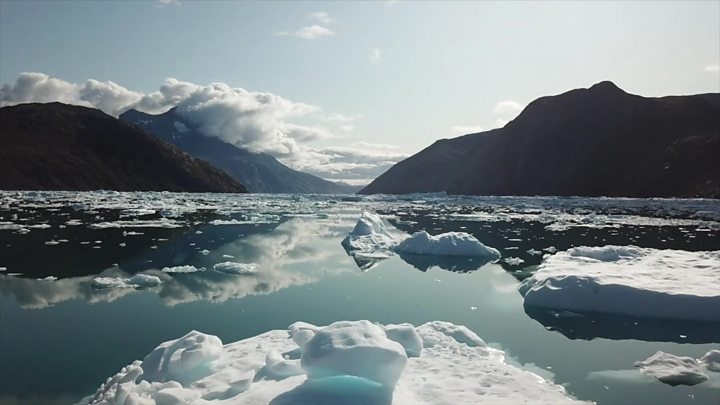
Media playback is unsupported on your device
The scientists previously looked at how the world would cope if temperatures rose by 1.5C by the end of this century. They also reported on how the lands of the Earth would be affected by climate change.
However, this new study, looking at the impact of rising temperatures on our oceans and frozen regions, is perhaps the most worrying and depressing of the three.
So what have they found and how bad is it?
In a nutshell, the waters are getting warmer, the world's ice is melting rapidly, and these have implications for almost every living thing on the planet.
"The blue planet is in serious danger right now, suffering many insults from many different directions and it's our fault," said Dr Jean-Pierre Gattuso, a co-ordinating lead author of the report.
The scientists are "virtually certain" that the global ocean has now warmed without pause since 1970.
The waters have soaked up more than 90% of the extra heat generated by humans over the past decades, and the rate at which it has taken up this heat has doubled since 1993.
Where the seas were once rising mainly due to thermal expansion, the IPCC says this is now happening principally because of the melting of Greenland and Antarctica.
Interactive Qaleraliq glacier, southern Greenland
2018
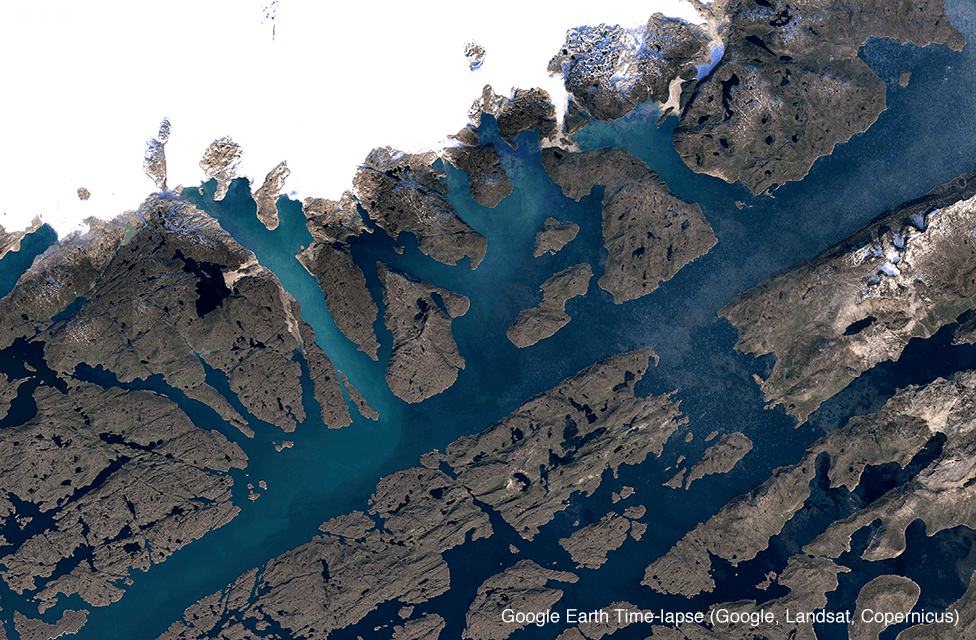
1993
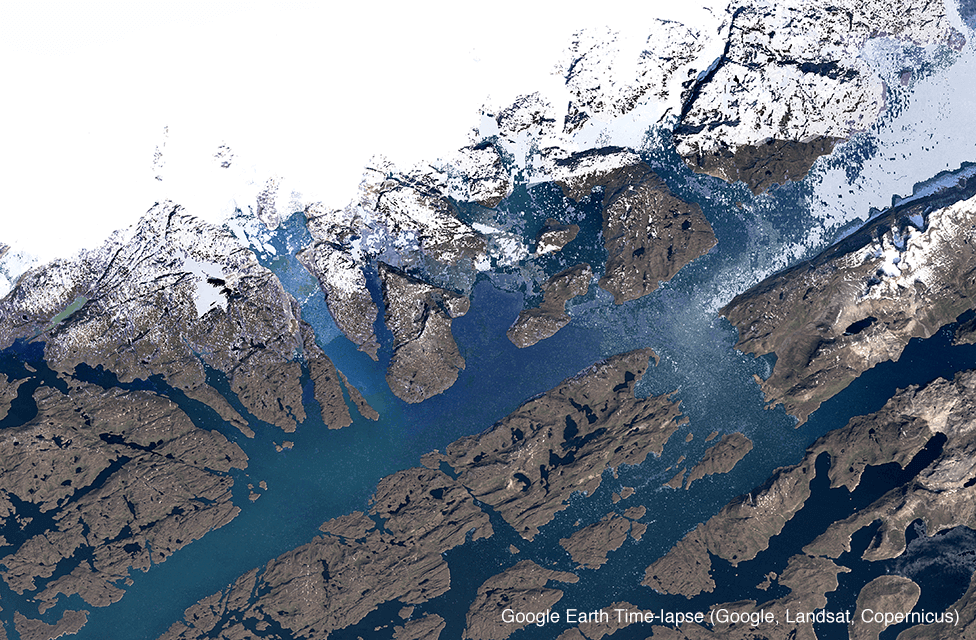
Thanks to warming, the loss of mass from the Antarctic ice sheet in the years between 2007 and 2016 tripled compared to the 10 years previously.
Greenland saw a doubling of mass loss over the same period. The report expects this to continue throughout the 21st Century and beyond.
For glaciers in areas like the tropical Andes, Central Europe and North Asia, the projections are that they will lose 80% of their ice by 2100 under a high carbon emissions scenario. This will have huge consequences for millions of people.
What are the implications of all this melting ice?
All this extra water gushing down to the seas is driving up average ocean water levels around the world. That will continue over the decades to come.
This new report says that global average sea levels could increase by up to 1.1m by 2100, in the worst warming scenario. This is a rise of 10cm on previous IPCC projections because of the larger ice loss now happening in Antarctica.
"What surprised me the most is the fact that the highest projected sea level rise has been revised upwards and it is now 1.1 metres," said Dr Jean-Pierre Gattuso, from the CNRS, France's national science agency.
"This will have widespread consequences for low lying coasts where almost 700 million people live and it is worrying."
Analysis by David Shukman - Science Editor, Hull
On the east coast of England, most of the city of Hull lies below the level of a typical high tide. The sea here can be both a source of wealth and a threat to life.
So the conclusions of the IPCC report have real meaning. A storm surge on a winter's night six years ago found a weak link in a sea wall and flooded businesses and homes.
New defences were ordered and the construction teams are now at work along the shore. But the barriers cannot protect everyone. Computer simulations, developed by the University of Hull, show that if the level of the ocean is one metre higher than now the centre of the city ought to be fine but neighbouring areas will go under.
This highlights a painful question, faced in low-lying places the world over: which should be saved and which should be abandoned as the waters rise?
The report says clearly that some island states are likely to become uninhabitable beyond 2100.
The scientists also say that relocating people away from threatened communities is worth considering "if safe alternative localities are available".
What will these changes mean for you?
One of the key messages is the way that the warming of the oceans and cryosphere (the icy bits on land) is part of a chain of poor outcomes that will affect millions of people well into the future.
Under higher emissions scenarios, even wealthy megacities such as New York or Shanghai and large tropical agricultural deltas such as the Mekong will face high or very high risks from sea level rise.
The report says that a world with severely increased levels of warm water will in turn give rise to big increases in nasty and dangerous weather events, such as surges from tropical cyclones.
"Extreme sea level events that are historically rare (once per century in the recent past) are projected to occur frequently (at least once per year) at many locations by 2050," the study says, even if future emissions of carbon are cut significantly.
"What we are seeing now is enduring and unprecedented change," said Prof Debra Roberts, a co-chair of an IPCC working group II.
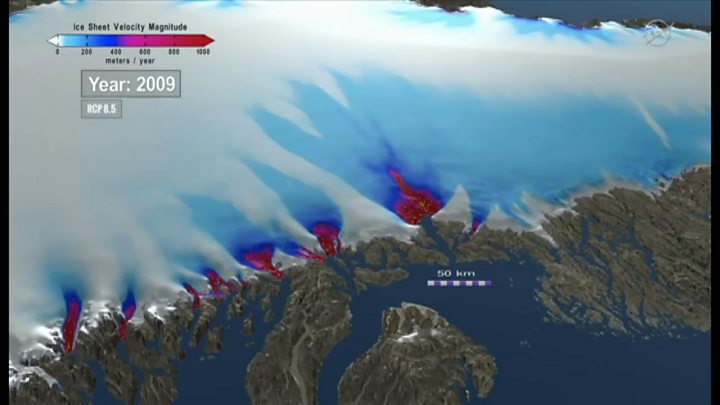
Media playback is unsupported on your device
"Even if you live in an inland part of the world, the changes in the climate system, drawn in by the very large changes in the ocean and cryosphere are going to impact the way you live your life and the opportunities for sustainable development."
The ways in which you may be affected are vast - flood damage could increase by two or three orders of magnitude. The acidification of the oceans thanks to increased CO2 is threatening corals, to such an extent that even at 1.5C of warming, some 90% will disappear.
Species of fish will move as ocean temperatures rise. Seafood safety could even be compromised because humans could be exposed to increased levels of mercury and persistent organic pollutants in marine plants and animals. These pollutants are released from the same fossil fuel burning that release the climate warming gas CO2.
Even our ability to generate electricity will be impaired as warming melts the glaciers, altering the availability of water for hydropower.
Permafrost not so permanent
Huge amounts of carbon are stored in the permanently frozen regions of the world such as in Siberia and Northern Canada.
These are likely to change dramatically, with around 70% of the near surface permafrost set to thaw if emissions continue to rise.
The big worry is that this could free up "tens to hundreds of billions of tonnes" of CO2 and methane to the atmosphere by 2100. This would be a significant limitation on our ability to limit global warming in the centuries to come.
So what happens in the long term?
That's a key question and much depends on what we do in the near term to limit emissions.
However, there are some warnings in the report that some changes may not be easily undone. Data from Antarctica suggests the onset of "irreversible ice sheet instability" which could see sea level rise by several metres within centuries.
"We give this sea level rise information to 2300, and the reason for that is that there is a lot of change locked in, to the ice sheets and the contribution that will have to sea level rise," said Dr Nerilie Abram from the Australian National University in Canberra, who's a contributing lead author on the report.
"So even in a scenario where we can reduce greenhouse gases, there are still future sea level rise that people will have to plan for."
There may also be significant and irreversible loses of cultural knowledge through the fact that the fish species that indigenous communities rely on may move to escape warming.
Does the report offer some guarded hope?
Definitely. The report makes a strong play of the fact that the future of our oceans is still in our hands.
The formula is well worn at this stage - deep, rapid cuts in carbon emissions in line with the IPCC report last year that required 45% reductions by 2030.
"If we reduce emissions sharply, consequences for people and their livelihoods will still be challenging, but potentially more manageable for those who are most vulnerable," said Hoesung Lee, chair of the IPCC.
Indeed, some of the scientists involved in the report believe that public pressure on politicians is a crucial part of increasing ambition.
"After the demonstrations of young people last week, I think they are the best chance for us,," said Dr Jean-Pierre Gattuso.
"They are dynamic, they are active I am hopeful they will continue their actions and they will make society change."
Follow Matt on Twitter.
What is your question on the IPCC report? Email: haveyoursay@bbc.co.uk.
You can also send your question in the following ways:
- WhatsApp: +44 7756 165803
- Tweet: @BBC_HaveYourSay
- Send an SMS or MMS to 61124 (UK) or +44 7624 800 100 (international)
- Please read our terms & conditions and privacy policy
https://www.bbc.com/news/science-environment-49817804
2019-09-25 10:02:25Z
52780392423353
Climate change: UN signals red alert for 'blue planet' - BBC News
Climate change is devastating our seas and frozen regions as never before, a major new United Nations report warns.
According to a UN panel of scientists, waters are rising, the ice is melting, and species are moving habitat due to human activities.
And the loss of permanently frozen lands threatens to unleash even more carbon, hastening the decline.
There is some guarded hope that the worst impacts can be avoided, with deep and immediate cuts to carbon emissions.
This is the third in a series of special reports that have been produced by the Intergovernmental Panel on Climate Change (IPCC) over the past 12 months.
The scientists previously looked at how the world would cope if temperatures rose by 1,5C by the end of this century. They also reported on how the lands of the Earth would be affected by climate change.
However, this new study, looking at the impact of rising temperatures on our oceans and frozen regions, is perhaps the most worrying and depressing of the three.
So what have they found and how bad is it?
In a nutshell, the waters are getting warmer, the world's ice is melting rapidly, and these have implications for almost every living thing on the planet.
"The blue planet is in serious danger right now, suffering many insults from many different directions and it's our fault," said Dr Jean-Pierre Gattuso, a co-ordinating lead author of the report.
The scientists are "virtually certain" that the global ocean has now warmed without pause since 1970.
The waters have soaked up more than 90% of the extra heat generated by humans over the past decades, and the rate at which it has taken up this heat has doubled since 1993.
Interactive Qaleraliq glacier, southern Greenland
2018

1993

Where the seas were once rising mainly due to thermal expansion, the IPCC says this is now happening principally because of the melting of Greenland and Antarctica.
Thanks to warming, the loss of mass from the Antarctic ice sheet in the years between 2007 and 2016 tripled compared to the 10 years previously.
Greenland saw a doubling of mass loss over the same period. The report expects this to continue throughout the 21st Century and beyond.
For glaciers in areas like the tropical Andes, Central Europe and North Asia, the projections are that they will lose 80% of their ice by 2100 under a high carbon emissions scenario. This will have huge consequences for millions of people.
What are the implications of all this melting ice?
All this extra water gushing down to the seas is driving up average ocean water levels around the world. That will continue over the decades to come.
This new report says that global average sea levels could increase by up to 1.1m by 2100, in the worst warming scenario. This is a rise of 10cm on previous IPCC projections because of the larger ice loss now happening in Antarctica.
"What surprised me the most is the fact that the highest projected sea level rise has been revised upwards and it is now 1.1 metres," said Dr Jean-Pierre Gattuso, from the CNRS, France's national science agency.
"This will have widespread consequences for low lying coasts where almost 700 million people live and it is worrying."
The report says clearly that some island states are likely to become uninhabitable beyond 2100.
The scientists also say that relocating people away from threatened communities is worth considering "if safe alternative localities are available".
What will these changes mean for you?
One of the key messages is the way that the warming of the oceans and cryosphere (the icy bits on land) is part of a chain of poor outcomes that will affect millions of people well into the future.
Under higher emissions scenarios, even wealthy megacities such as New York or Shanghai and large tropical agricultural deltas such as the Mekong will face high or very high risks from sea level rise.
The report says that a world with severely increased levels of warm water will in turn give rise to big increases in nasty and dangerous weather events, such as surges from tropical cyclones.
"Extreme sea level events that are historically rare (once per century in the recent past) are projected to occur frequently (at least once per year) at many locations by 2050," the study says, even if future emissions of carbon are cut significantly.
"What we are seeing now is enduring and unprecedented change," said Prof Debra Roberts, a co-chair of an IPCC working group II.
"Even if you live in an inland part of the world, the changes in the climate system, drawn in by the very large changes in the ocean and cryosphere are going to impact the way you live your life and the opportunities for sustainable development."
The ways in which you may be affected are vast - flood damage could increase by two or three orders of magnitude. The acidification of the oceans thanks to increased CO2 is threatening corals, to such an extent that even at 1.5C of warming, some 90% will disappear.
Species of fish will move as ocean temperatures rise. Seafood safety could even be compromised because humans could be exposed to increased levels of mercury and persistent organic pollutants in marine plants and animals. These pollutants are released from the same fossil fuel burning that release the climate warming gas CO2.
Even our ability to generate electricity will be impaired as warming melts the glaciers, altering the availability of water for hydropower.
Permafrost not so permanent
Huge amounts of carbon are stored in the permanently frozen regions of the world such as in Siberia and Northern Canada.
These are likely to change dramatically, with around 70% of the near surface permafrost set to thaw if emissions continue to rise.
The big worry is that this could free up "tens to hundreds of billions of tonnes" of CO2 and methane to the atmosphere by 2100. This would be a significant limitation on our ability to limit global warming in the centuries to come.
So what happens in the long term?
That's a key question and much depends on what we do in the near term to limit emissions.
However, there are some warnings in the report that some changes may not be easily undone. Data from Antarctica suggests the onset of "irreversible ice sheet instability" which could see sea level rise by several metres within centuries.
"We give this sea level rise information to 2300, and the reason for that is that there is a lot of change locked in, to the ice sheets and the contribution that will have to sea level rise," said Dr Nerilie Abram, who's a contributing lead author on the report.
"So even in a scenario where we can reduce greenhouse gases, there are still future sea level rise that people will have to plan for."
There may also be significant and irreversible loses of cultural knowledge through the fact that the fish species that indigenous communities rely on may move to escape warming.
Does the report offer some guarded hope?
Yes. Definitely. The report makes a strong play of the fact that the future of our oceans is still in our hands.
The formula is well worn at this stage - deep, rapid cuts in carbon emissions in line with the IPCC report last year that required 45% reductions by 2030.
"If we reduce emissions sharply, consequences for people and their livelihoods will still be challenging, but potentially more manageable for those who are most vulnerable," said Hoesung Lee, chair of the IPCC.
Indeed, some of the scientists involved in the report believe that public pressure on politicians is a crucial part of increasing ambition.
"After the demonstrations of young people last week, I think they are the best chance for us,," said Dr Jean-Pierre Gattuso.
"They are dynamic, they are active I am hopeful they will continue their actions and they will make society change."
Follow Matt on Twitter.
https://www.bbc.com/news/science-environment-49817804
2019-09-25 09:00:09Z
52780392423353